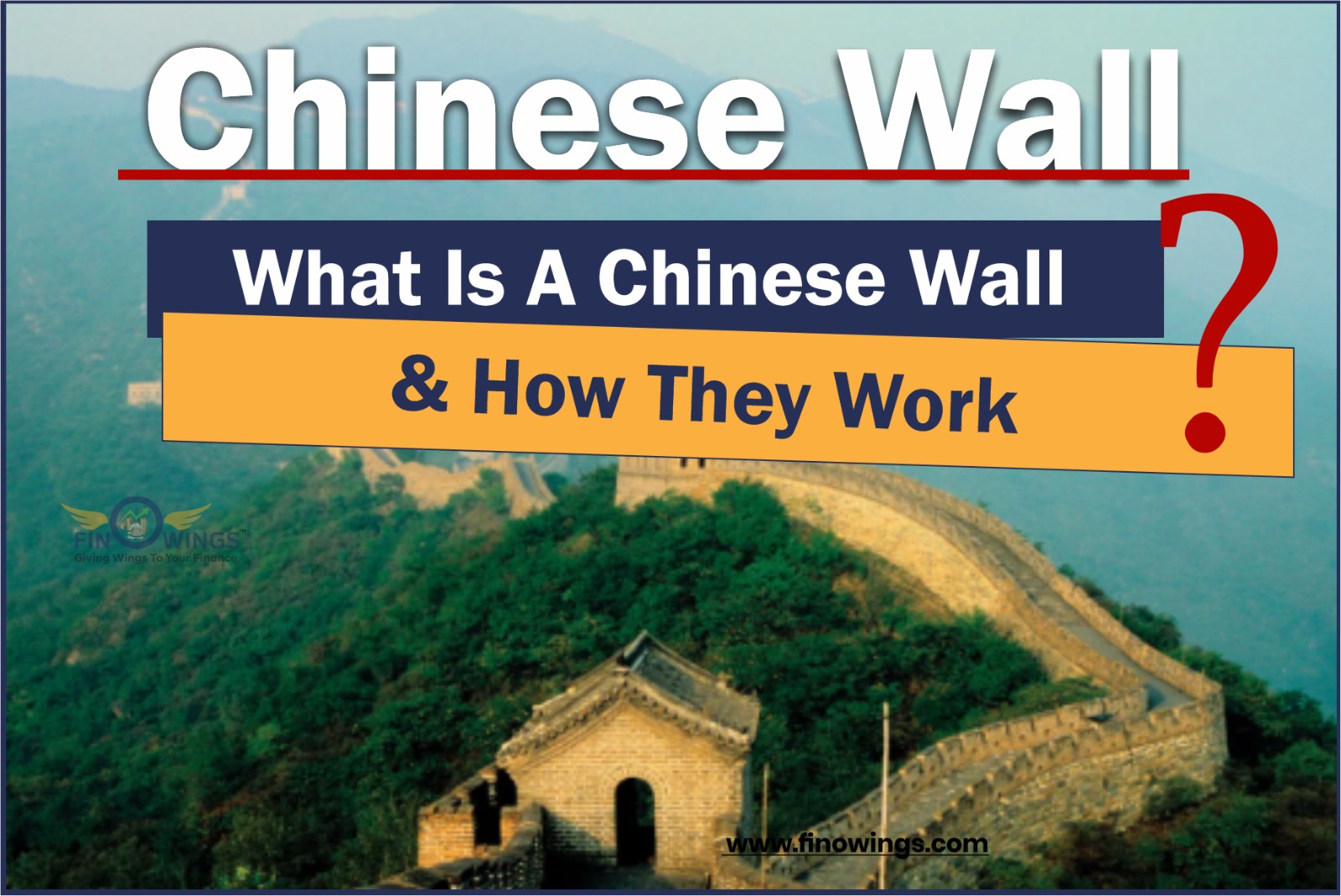Home >> Blog >> Chinese Wall - What Is A Chinese Wall & How They Work?
Chinese Wall - What Is A Chinese Wall & How They Work?

Table of Contents
Introduction
Over the years, major financial organizations have employed Chinese Wall principles to create ethical boundaries between departments and self-regulate their commercial transactions. However, these attempts haven't always been successful. As a result, the Securities and Exchange Commission (SEC) has developed rules governing the information-sharing practices of financial institutions. According to the SEC, businesses that disregard these laws risk fines, penalties, and legal repercussions. So what exactly is the Chinese Wall, though?
What Is a Chinese Wall?
A virtual wall known as a "Chinese wall" is used in the business world to block information sharing across departments if doing so would lead to unethical or illegal business practices. For example, Chinese walls have been used by corporations, brokerage houses, investment banks, and retail banks in the United States to depict circumstances where confidentiality is necessary to prevent conflicts of interest.
How Does a Chinese Wall Work?
The practice of building a Chinese wall inside a company is one that investment banking routinely engages in. Investment bankers frequently have access to vital, confidential information about publicly traded businesses or preparing to go public through an IPO through their client connections. The investment bankers' responsibility is to build information security barriers that prevent sensitive data from being transmitted between bank divisions and other business units.
The demand for a Chinese wall in the finance industry increased after the Gramm-Leach-Bliley Act (GLBA) was passed in 1999. The legislation eliminated federal laws that barred companies from providing any blend of banking, investing, and insurance services. Constraints on such pairings that had been in place since the Great Depression were removed by the GLBA. The GLBA also facilitated the establishment of current financial titans like Citigroup and JPMorgan Chase.
Chinese Wall Examples
A public business aiming to acquire a rival may have a corporate investment arm working on behalf of a financial services company. Since there is a danger that the information could be utilized for illegal insider trading, the discussions are kept fully confidential. However, another section of the same company may employ investment advisors who actively encourage clients to buy or sell stock in the questioned companies. The purpose of the Chinese Wall is to prevent financial advisors from learning about acquisition negotiations.
In 2002, the Sarbanes-Oxley Act (SOX), which mandated that businesses have more stringent insider trading protections, emphasized the necessity of a Chinese wall policy.
The idea of a Chinese wall is applied to other professions. They could be either transient or long-term. To avoid actual or perceived collusion or bias, a temporary barrier may be placed between the two legal teams, for instance, if a law practice represents both parties in a legal dispute.
Example - How Bank uses a Chinese Wall policy to comply with securities regulations
Material Nonpublic Information
Investment bankers are legally forbidden from discussing important, nonpublic data about a publicly listed company with anybody who does not need to know about it to assist the investor who provided the data to the Bank.
The purpose of a bank's information barriers is to effectively regulate the flow of sensitive data from one area of the Bank to another or from one Bank or area of the Bank to any other business unit within the Bank.
The only bank workers who may be taken "over the wall" are actively involved in servicing the client or necessary members within top management and due diligence stages of an investment banking transaction.
Getting Employees Through the Chinese Wall
Under certain conditions, employees of the departments of Credit Capital Markets, Commercial Banking, Equity Research, and Risk Management may receive access to material, nonpublic information from investment bankers in connection with specific investment financial transactions for legitimate business needs.
However, information sharing with a research analyst requires the prior authorization of the Head of Research. Furthermore, it is only permissible under specific conditions after consulting the members of the Compliance Department.
Compliance may advise limitations on the recipient's usual actions depending on the importance of the data and the environment in which it will be utilized. For example, sending information that is unlikely to become public during an investment banking assignment, including long-term business estimates, should be done with extra prudence. This is because the beneficiary might not be able to conduct regular business operations once the investment banking assignment is over (including personal trading).
Finally, investment bankers should remind the client's officers that no confidential information should be disclosed to any banker (including, in particular, research analysts and employees in Institutional Equities Sales and Trading) who has not managed to bring over the Wall for the transaction when they are involved in an unannounced potential transaction.
Employees who are Above the Chinese Wall
Senior staffers in the risk management team, internal audit, corporate security, legal, and compliance teams are typically "above the wall." On both sides of information walls, people "above the wall" may have access to crucial nonpublic information.
Access to such information is not restricted by the standard procedural safeguards of an information barrier, also known as a "Chinese Wall," so the recipient must take extra precautions to prevent improper use or disclosure of nonpublic information, especially to staff members in the Institutional Equities and Research departments.
Those "above the wall" are almost always forbidden from advising the client regarding the individual transaction. However, suppose the Bank's conflicts are effectively controlled. In that case, those "above the wall" may play senior executives or advisory positions with more than one deal team after consulting with Compliance.
Chinese Walls play a significant role in investment banking compliance and best practices.
Interesting facts about the term 'Chinese Wall.'
The Great Wall of China, a fortified barrier constructed in ancient times to defend China from its adversaries, served as the inspiration for the name of the Chinese Wall. Likewise, the phrase first entered English when Congress debated the need to create regulatory barriers between brokers and investment bankers immediately after the 1929 stock market crisis.
The phrase has received criticism recently for being culturally insensitive. The offensiveness of the word and its negative connotation toward Chinese culture and business methods were extensively discussed in writing by Justice Low, a judge in the Peat, Marwick, Mitchell & Co. vs. the Supreme Court case in 1988.
The judge even emphasized that the metaphor wasn't acceptable. The Great Wall of China is a one-way barrier built to keep invaders out, whereas the phrase refers to a two-way seal intended to block communication between parties. Justice Low suggested the term "ethical wall" as a substitute.
Conclusion
A Chinese wall is an internal firm measure used to ensure that information obtained while acting for one client does not leak to people in another part of the same firm who are acting for another client to whom that information may be highly relevant. The primary goals are to protect client confidentiality and, if the firm conducts "investment business," to ensure fair treatment of all clients or customers.
Author
Warning: Undefined variable $faq7 in /home/u935223235/domains/finowings.com/public_html/blog-topic.php on line 758














